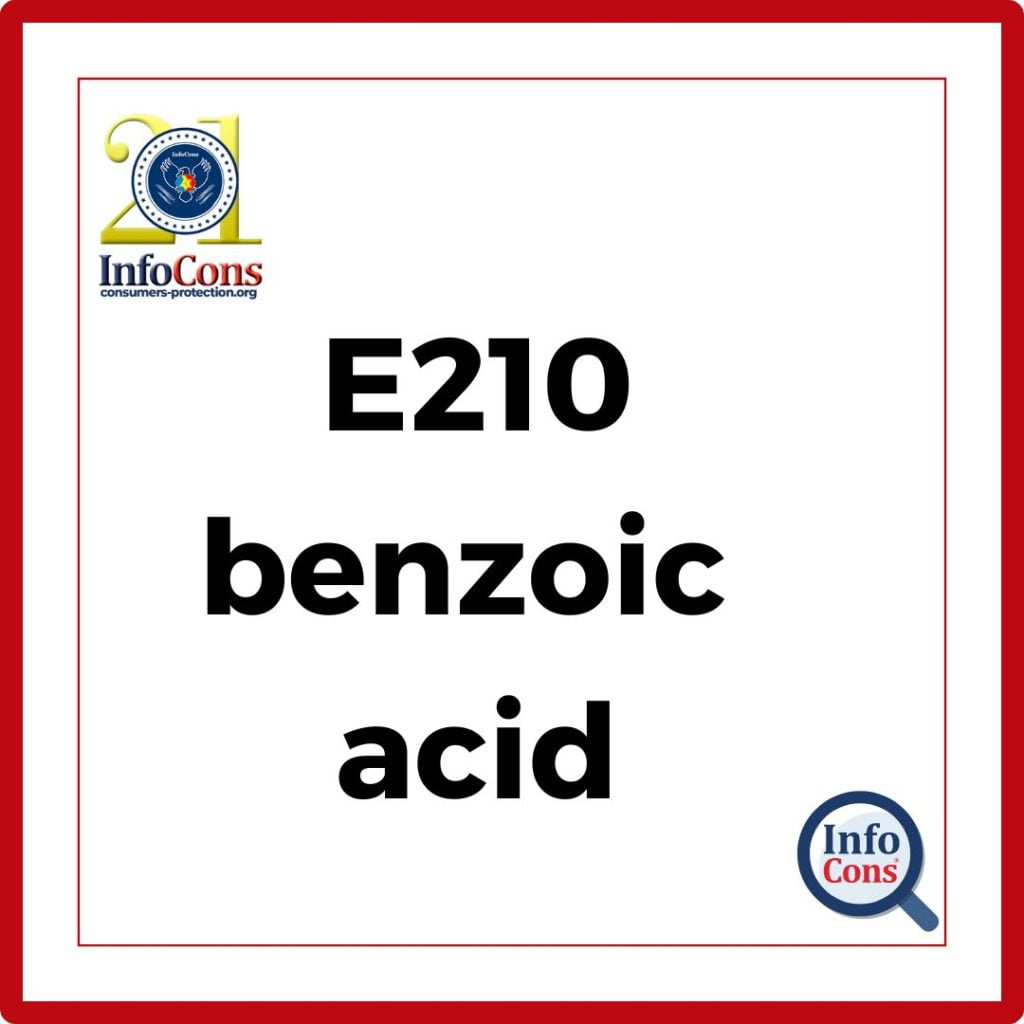What is the Food Additive E210 ?
In the world of food preservation and additives, E210, also known as benzoic acid, plays a crucial role. This chemical compound is used to extend the shelf life of various food products.
Benzoic acid and benzoates are utilized as preservatives against yeasts and molds in acidic products. They are not very effective against bacteria and are ineffective in products with a pH higher than 5 (slightly acidic or neutral).
InfoCons Consumer Protection Recommendation: How to Choose Fruits and Vegetables at the Store
What is the Recommended Daily Dose ?
Benzoic acid is subject to strict regulations globally. The European Food Safety Authority (EFSA) has set maximum allowable concentrations in various food products to minimize potential health risks in the European region.
A maximum daily dose of 5 mg per kg of body weight per day has been established. When used within the recommended limits, benzoic acid is considered safe for consumption.
The use of E210 is generally regulated, with the allowable concentration varying between 0.05% and 0.1% of the food product, depending on the country.
Do You Know Which Products Contain the Additive E210 ? InfoCons Consumer Protection informs you !
1. Food Preservation
Benzoic acid and its salts, such as sodium benzoate (E211), are widely used in the food industry to extend shelf life by preventing the growth of microbes and bacteria. It is commonly found in:
- Beverages: Soft drinks, fruit juices.
- Condiments: Pickles and salad dressings.
- Bakery Products: Cakes and pastries.
2. Pharmaceuticals
In pharmaceutical products, benzoic acid (E210) serves as an antifungal and antimicrobial agent. It is an ingredient in topical creams and ointments used to treat skin infections and fungal conditions.
3. Cosmetics and Personal Care
Benzoic acid, E210, is found in various cosmetic products, including lotions, shampoos, and deodorants, where it acts as a preservative. Its effectiveness in preventing the growth of bacteria and fungi helps maintain product integrity.
4. Industrial Uses
Outside of food and personal care products, E210 is used in the production of alkyd resins, which are used in paints and coatings. It also serves as a precursor in the synthesis of various chemicals.
Consumer Protection Tips : Why is it important to have the European Health Insurance Card ?
Contraindications and Risks
Despite its widespread use and approval, there are some concerns regarding E210:
1. Allergic Reactions
Some individuals may experience allergic reactions to benzoic acid, manifesting as skin rashes, asthma, or other allergic symptoms.
2. Interaction with Ascorbic Acid
When E210 reacts with ascorbic acid (vitamin C), it forms benzene, a known carcinogen. Although the levels of benzene formed in foods are generally very low, regulatory agencies continue to monitor and manage this risk.
3. Environmental Impact
While benzoic acid is biodegradable, its production and use in large quantities may pose environmental challenges. Efforts to develop greener production methods and minimize waste should be considered for the future.
In conclusion, E210, or benzoic acid, is a valuable food additive that helps ensure the safety and longevity of a wide range of products. Although there are some health and environmental concerns, its benefits in extending shelf life and preventing spoilage make it an indispensable component in the food and pharmaceutical industries.
As research continues, the use of benzoic acid will evolve, potentially leading to even safer and more effective applications.
Read also – E180 – Litholrubine . InfoCons Consumer Protection informs you about which food products contain this additive .
Download the InfoCons application !
Look for products that have a cleaner label or use natural additives. By installing Consumer Protection InfoCons App and scanning the barcodes of food products, you can find out the number and type of food additives they contain.
Author – Cosmina Nițu
Master in Nutrition – Infant and new born nutrition
Sources:
https://www.efsa.europa.eu/en/ – European Food Safety Authority (EFSA)
https://www.sciencedirect.com/ – Science Direct
InfoCons – European Organization for Consumers Protection and Promotion of Programs and Strategies , a full member of the World Organization Consumers International, founding member of the Federation of Consumer Associations, and member of ANEC.
